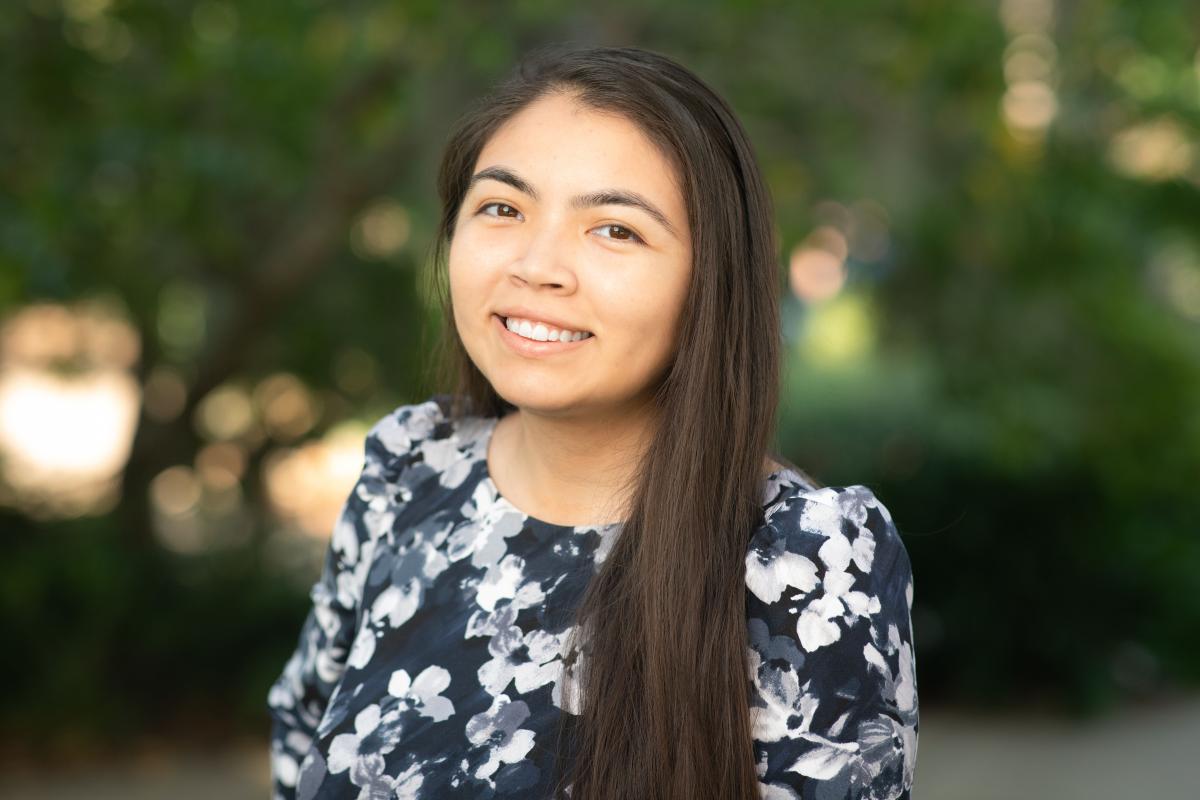Student Spotlight: Inge Guerrero

Inge Guerrero is a fifth-year doctoral student pursuing a degree through Florida State University’s Program in Neuroscience, an interdisciplinary program with participation from the Department of Biological Science and Department of Psychology, both part of the College of Arts and Sciences, as well as FSU’s College of Medicine. She earned her bachelor’s from the Department of Chemistry and Biochemistry in 2018 and a master’s in psychology from Grand Canyon University in 2020 before returning to FSU for her doctorate. Guerrero researches metabolic needs and hedonic motivation drive eating, especially food high in sugar and fat, under the mentorship of Distinguished Research Professor of Psychology Linda Rinaman. In 2023, she earned the McKnight Doctoral Fellowship Award to support her doctoral studies.
Tell us about your background, where you’re from and what brought you to FSU.
I was born in Colombia and moved to the U.S. as a teenager. While I initially didn’t plan on attending FSU, I prayed about it and felt called here. I’m grateful I followed this calling because I had an incredible experience as an undergraduate. When it came time to apply for doctoral programs, I sought God’s guidance to find the best fit for me and my family, and FSU proved to be the answer once again.
What inspired you to pursue a doctoral degree in neuroscience?
As an undergraduate, I had the opportunity to conduct research in different labs, and one of my favorites was with professor of behavioral sciences and social medicine Robert Glueckauf. His work in clinical psychology showed me the impact of meaningful research. At the same time, Winston Roberts, physics professor emeritus, inspired me with his ability to explain complex material that made learning enjoyable. Together, they sparked my initial interest in academia.
Later, during my master’s studies, I noticed many individuals with anxiety either overate or lost their appetite under stress. That made me curious about the connections among stress, eating behavior and brain-gut signaling, which ultimately led me to neuroscience.
What aspects of your studies do you find most rewarding?
Collecting data can be physically demanding and often requires working overtime, so the most rewarding moments are when I begin graphing, analyzing and interpreting the results. Seeing the story that data tells makes all the effort worthwhile.
Break down your areas of research for us.
Glucagon-like peptide-1 (GLP-1) medications are well known for promoting weight loss — some individuals lose up to 20 percent of their body weight while taking them. However, the challenge is that patients must continue the medication indefinitely to maintain results, and for people with obesity, even a 20 percent reduction may not be enough to reach a healthy weight.
My research investigates whether a combination of peptides — not just GLP-1 but also GLP-2, glucagon, oxyntomodulin and glicentin — produces stronger or longer-lasting effects. To study this, I use a model that lacks all five peptides. If giving the peptides reduces food intake and body weight, then removing them helps us understand their unique roles by producing the opposite effect. This allows me to test how these peptides regulate eating behavior, food preferences and stress-related changes in diet.
What do you want the public to know about the importance of your research?
My research goes beyond exploring ways to lose weight. I study the mechanisms behind eating behavior — how much study subjects eat, what foods they choose, and how stress affects those choices. By studying glucagon or Gcg gene products, I hope to learn how these peptides influence food preferences, stress responses, and choices between sugary or nutrient-rich drinks. This knowledge could help create better long-term treatments for obesity and related health conditions.
What does earning the McKnight Doctoral Fellowship mean to you?
I’m blessed to be a McKnight Doctoral Fellow. It feels like being a part of an extended family. The fellowship provides professional development, networking opportunities and a strong community. Guidance from senior fellows has been especially valuable, including advice and encouragement to those of us earlier in the program. Most importantly, the faculty and staff genuinely love what they do, and their kindness makes a lasting impact.
Tell us about your current projects.
I’m working on a manuscript that examines which brain and spinal cord regions provide input to GLP-1 neurons. This research helps identify the areas that modulate GLP-1 activity in the brain, paving the way for future studies on their functional connections. I’m also finishing data collection for my dissertation, which focuses on how Gcg gene products — GLP-1, GLP-2, glucagon, oxyntomodulin and glicentin — influence eating behavior and body weight.
Are there any faculty or staff who have inspired you?
I’ve been fortunate to learn from many mentors at FSU. My primary adviser, Linda Rinaman, has given me the freedom to design experiments and shape my dissertation questions. I also learned essential lab techniques from FSU research associate professor Huiyuan Zheng, who has since retired. Through the Integrated Clinical Neuroscience Training for Translational Research Fellowship, I worked with Robert O. Lawton Distinguished Professor of Psychology Pamela Keel, whose mentoring style inspired me.
Sarah Van Ingen Lauer, an associate professor of mathematics education at the University of South Florida in Tampa, who I met through a friend during graduate school, has also been especially impactful. She’s become a meaningful mentor — especially as a first-generation college student — and meets with me weekly for encouragement, prayer and accountability.
What on-campus resources have helped you achieve success?
The Office of Graduate Fellowships and Awards has been incredibly helpful, especially program manager Keith McCall and director Adrienne Stephenson. Their guidance on applying for fellowships and awards has opened many doors for me.
Although you might miss FSU, what are you looking forward to once you graduate?
I’m looking forward to investigating the questions I haven’t yet been able to answer. I’m excited to keep doing science, expand my work on eating behavior, and mentor the next generation of students.
